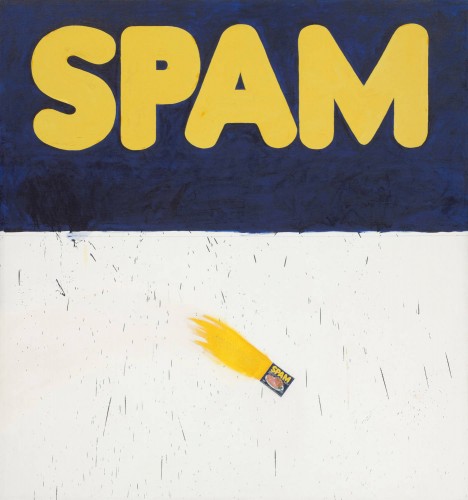More from the 'Email is ruining our lives' department
I have not written about email and how horrible it is for some time, so I was kind of glad that I was reminded of that horribleness (probably not a word, but let's keep going), while reviewing a recent survey about after-work hours email habits published by the enterprise service management company Samanage.
It's a short, but informative report, and I recommend taking a few minutes to read the entire thing, but if you can't spare the 20 minutes or so (probably because you have to get back to your email), I will just call out the two most interesting survey findings and then because you expect no less, offer some FREE commentary about what these data points should make us think about as HR/business leaders. Ed Ruscha 'Actual Size', 1962
Ed Ruscha 'Actual Size', 1962
Finding 1:
More than 1 in 3 survey respondents (35.2%), said they spend more than 1 hour per day checking emails outside of work.
Implication: The demands and expectations on many of us are so high that we simply can never get 'caught up', at least to the point where we can enjoy a night, or heaven forbid an entire weekend, without work, (in the form of endless emails), continuing to roll in.
When asked why we spend so much time after hours on email, almost all the responses are some version of the notion (and expectation), that if we don't spend at least part of your off-hours dealing with email, you won't be doing your job. That's pretty sad, and pretty frightening at the same time.
Finding 2:
20% of survey respondents reported that checking after-hours email produces negative feelings about work, including feeling overwhelmed and frustrated.
Implication: Of all the findings in the survey, this is the one that I think bears the most consideration by HR and business leaders. The long-term, heck even medium-term effects of this email overload into all hours of the day and night are taking a toll on the workforce, at least 20% of them anyway. And that is not an insignificant figure. How would you feel if you knew that 20% of your team was 'overwhelmed and frustrated?'
And it is not just the employee's feelings and welfare you should think about. What about their friends and family members who all too often find themselves taking a back seat to your employee having to answer her email during dinner or at the ball game or when they are meant to be doing something, anything that is 'not work?'
Ugh. But I know that email is never going away, not in our working lifetimes anyway. I have finally resigned myself to that reality.
However it can be less terrible. And we can do better to make sure it is not ruining our free time, filling us with anxiety, and tethering us to our work and workplaces no matter where we may be and what we are doing.
I don't think I am going to write about email anymore, at least for some time. I am kind of tired of thinking about it. But after all these years and the many, many hours I have spent writing about the tool I guess the simplest conclusion or recommendation I have reached to try and make things better is this:
Before writing another email, especially one after hours or on the weekend stop writing and think for 30 seconds or "Do I really, really need to send this message, with this information, to these people, right now?"
Followed closely by a this follow-up:
"How do I want people to feel about me, their job, the team, and the organization when they see this email?"
Think about both of these questions before you hit 'send' at 11:30PM on Friday night.
Actually, think about them at 10:20AM on Tuesday as well.
Have a great week!
 Communication,
Communication,  Technology tagged
Technology tagged  HR,
HR,  Technology,
Technology,  communication,
communication,  email,
email,  work,
work,  work life
work life  Email Article
Email Article 
 Print Article
Print Article 

